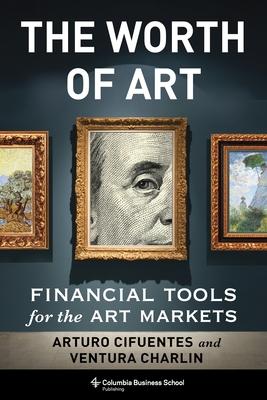Silver Medal Winner, 2024 Axiom Business Book Award, Personal Finance / Retirement Planning / Investing
The market for art can be as eye-catching as artworks themselves. Works by artists from da Vinci and Rembrandt to Picasso and Modigliani have sold for hundreds of millions of dollars. The world's ultrawealthy increasingly treat art as part of their portfolios. Since artworks are often valuable assets, how should financial professionals analyze them? Arturo Cifuentes and Ventura Charlin provide an expert guide to the methods, risks, and rewards of investing in art. They detail how to apply the financial and statistical tools and techniques used to evaluate more traditional investments such as stocks, bonds, and real estate to art markets. The Worth of Art: Financial Tools for the Art Markets shows readers how to use empirical evidence to answer questions such as: How do the returns on Basquiat compare to the S&P 500? Are Monet's portraits as valuable as his landscapes? Do red paintings fetch higher prices than blue ones, and does the color palette matter equally to the sales of abstract Rothkos and figurative Hockneys? How much should be loaned to a borrower who is pledging one of Joan Mitchell's late abstract paintings as collateral? Would the risk-return profile of a conventional portfolio benefit from exposure to Warhol? Rigorous and readable, this book also demonstrates how quantitative analysis can deepen aesthetic appreciation of art.
Book
The Worth of Art: Financial Tools for the Art Markets
(Write a Review)
Hardcover
$33.33
Silver Medal Winner, 2024 Axiom Business Book Award, Personal Finance / Retirement Planning / Investing
The market for art can be as eye-catching as artworks themselves. Works by artists from da Vinci and Rembrandt to Picasso and Modigliani have sold for hundreds of millions of dollars. The world's ultrawealthy increasingly treat art as part of their portfolios. Since artworks are often valuable assets, how should financial professionals analyze them? Arturo Cifuentes and Ventura Charlin provide an expert guide to the methods, risks, and rewards of investing in art. They detail how to apply the financial and statistical tools and techniques used to evaluate more traditional investments such as stocks, bonds, and real estate to art markets. The Worth of Art: Financial Tools for the Art Markets shows readers how to use empirical evidence to answer questions such as: How do the returns on Basquiat compare to the S&P 500? Are Monet's portraits as valuable as his landscapes? Do red paintings fetch higher prices than blue ones, and does the color palette matter equally to the sales of abstract Rothkos and figurative Hockneys? How much should be loaned to a borrower who is pledging one of Joan Mitchell's late abstract paintings as collateral? Would the risk-return profile of a conventional portfolio benefit from exposure to Warhol? Rigorous and readable, this book also demonstrates how quantitative analysis can deepen aesthetic appreciation of art.Hardcover
$33.33